We invite you to honor Kitty's incredible impact on Frontier by contributing to the Kitty Ernst Scholarship Fund. Kitty was always a big proponent of giving back and paying it forward. This is a wonderful opportunity to provide for future Frontier students.
Eunice Katherine “Kitty” MacDonald Ernst, RN, CNM, MPH, DSc (Hon)
July 21, 1926 - December 28, 2021
December 30, 2021
Dear Frontier Community,
It is with deep sadness that I reach out to you today to report that our beloved Kitty Ernst passed away peacefully at home on December 28, 2021. Words cannot adequately express Kitty’s impact nor how much she will be missed. She was our mentor, visionary, taskmaster, cheerleader, and dear friend. Please circle up with me as together, we mourn the loss of Kitty Ernst, a wonderful woman, educator, and pioneer for nurse-midwifery. We reflect on her life, her work and impact on FNU, and the legacy that she leaves behind.
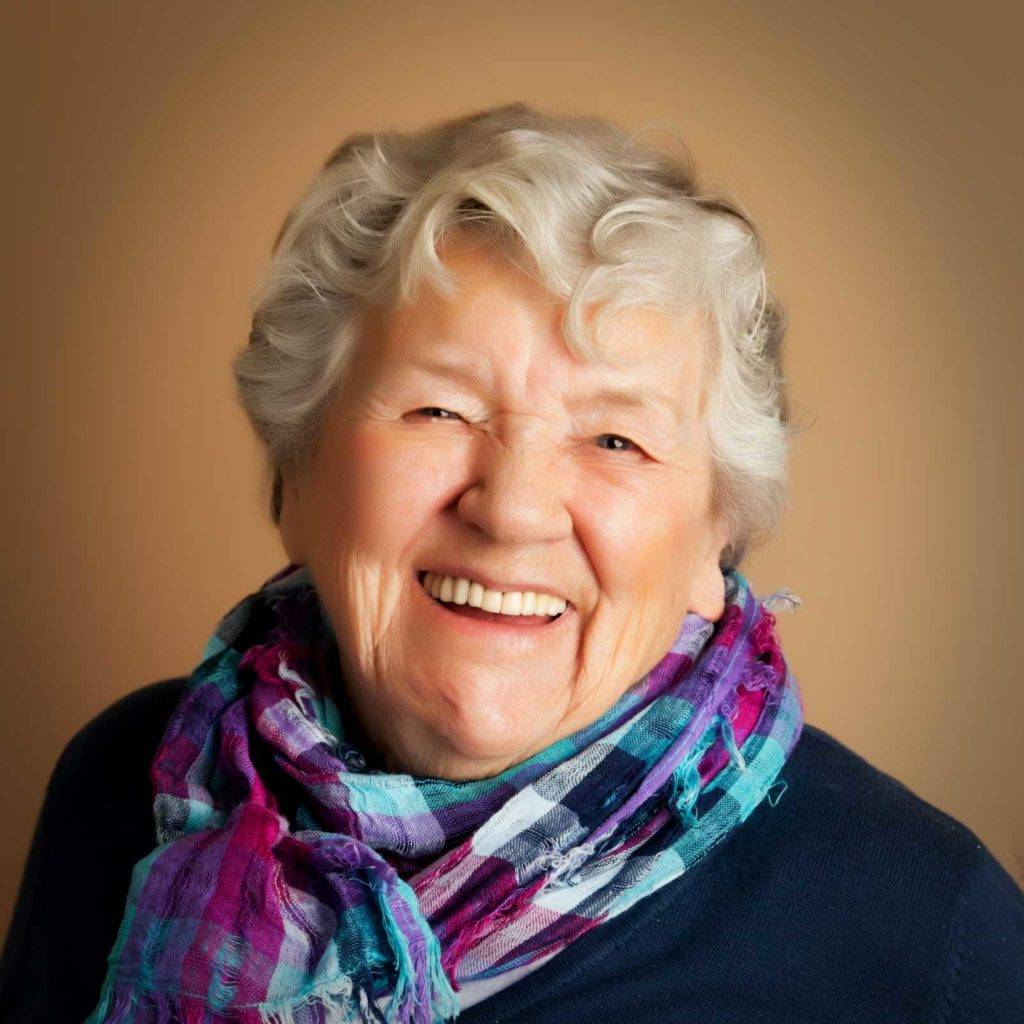
Kitty Ernst
Born on July 21, 1926, in Waltham, Massachusetts, Eunice Katherine “Kitty” Macdonald Ernst was a dynamic and committed pioneer in midwifery education and practice. She was passionate about ensuring that all families receive the best possible care during pregnancy and birth. She was the wife of the late Albert T. Ernst Sr who died in 2011. Kitty was the daughter of the late John D. and Esther C. Macdonald. She lived her life by the words of Winston Churchill, “Never, never, never give up.”
Even as a young nurse, Kitty knew that she wanted to work in a place where she would make a difference in the lives of women and families. After graduating from the Waltham Hospital School of Nursing in Massachusetts, Kitty made the decision to embark on an adventure by working at Frontier Nursing Service (FNS) in Kentucky. During her time as a nurse at FNS, she was introduced to nurse-midwifery and ultimately decided to attend the Frontier Graduate School of Midwifery, a part of the FNS, in Hyden, Kentucky, in 1951. During her time as a midwifery student at FNS, Kitty realized the importance of midwifery on the health of women and families. Throughout her life, Kitty often told the story of how awestruck she was when she first witnessed the power of a woman birthing in her own mountain home. Those first births Kitty witnessed as a midwifery student set her on a lifelong course of promoting and supporting normal birth, in a safe and comfortable setting, and educating midwifery students in these principles. Kitty knew that educating new nurse-midwives was essential to transforming health care not only for mothers but for their families as well.
Following her time at FNS, Kitty went on to earn a bachelor’s degree in education from Hunter College in 1957 and a master’s degree in public health from Columbia University in 1959. From 1954-58, Kitty also served as a nurse-midwife for the Maternity Center Association (MCA) in New York City.
After practicing as a nurse-midwife, Kitty turned her attention to advocating for nurse-midwives to play an important and respected role in our society’s health care system, a pursuit she continued throughout her life. She also started her own family, marrying Albert T. Ernst in 1961. Together, they had three children, Rosemary, Albert “Ted” Jr., and Kate.
During this time, Kitty began working as a parent educator, teaching some of the first childbirth education groups of the International Childbirth Education Association. As a field consultant for MCA, she developed family-centered maternity care provided by an obstetrician nurse-midwife team at the Salvation Army Booth Maternity Center in Philadelphia.
Kitty was passionately committed to birth centers as a key solution to challenges in maternity care. Generations of midwives have learned from Kitty that birth centers are crucial to providing midwives with a place to practice true midwifery; as a safe, cost-effective, and satisfying place for families to grow; and must be a part of the health care system. Kitty co-founded the National Association of Childbearing Centers (NACC) in 1983 now the American Association of Birth Centers. As Director of the NACC, she continued to be a leader in the effort to bring birth centers into the mainstream of health care delivery and steered the development of the Commission for Accreditation of Freestanding Birth Centers in 1985.
In the 1980s, Kitty became particularly concerned about two issues: the small number of nurse-midwives being educated each year, and the fact that the majority of nurse-midwives being educated in large tertiary care centers had a lack of out-of-hospital experience. To address these issues, she led the design and implementation of the first distance education program for nurse-midwives, which was adopted by the Frontier School of Midwifery and Family Nursing, now known as Frontier Nursing University (FNU). Over many years, Kitty graciously shared her personal story, her passion, and her vision with every single class of incoming FNU students.
Kitty, who often quoted one of the key beliefs of FNS that “all health care begins with the care and education of the mother,” maintained strong ties with FNU throughout her life. She served on FNU’s Board of Directors from 1975-2021 and was awarded an honorary doctorate from FNU in 2011. Kitty also occupied the first endowed chair in the profession, the Mary Breckinridge Chair of Midwifery.
Kitty is revered not only by FNU but by other institutions as well. She served as the president of the American College of Nurse-Midwives (ACNM) from 1961-63 and again from 2007-2008. Beginning in 1998, ACNM annually presents the Kitty Ernst Award to “an exceptional, relatively new CNM/CM who is an ACNM member, has been certified for less than ten years and has demonstrated innovative, creative endeavors in midwifery and/or women’s health clinical practice, education, administration, or research.”
The criteria for the ACNM Kitty Ernst Award is befitting of Kitty’s contributions to the profession. She was a leader in education and administration, conducting the first wave of accreditation for nurse-midwifery education programs and developing the first “What is a Nurse-Midwife” brochure. Over the course of her career, she published valuable information defining the role of a nurse-midwife and played a crucial role in the first accreditation of nurse-midwife programs in the U.S. As the Director of the pilot Community-based Nurse-Midwifery Education Program (CNEP), she developed a model for meeting the overwhelming need for experienced birth center nurse-midwives committed to innovative family-centered maternity.
Kitty’s impact spread far and wide. She traveled across the U.S. and abroad to Germany, Scotland, Hungary, Belgium, Russia, and Haiti to provide consultation and workshops on the midwifery model of care in birth centers.
Kitty’s many accolades included the Martha Mae Elliot Award for Exceptional Health Service to Mothers and Children from the American Public Health Association. ACNM presented Kitty with the Hattie Hemschemeyer Award, which honors an exceptional certified nurse-midwife or certified midwife who is an ACNM member who has provided continuous outstanding contributions or distinguished service to midwifery. She received the Childbirth Connection Medal for Distinguished Service and was awarded the Maternity Center Association’s Carola Warburg Rothschild Award, which recognizes outstanding contributions to the health and well-being of women and their families.
Kitty’s impact was significant and everlasting upon every person she met and every organization she served. She was a dear friend, loyal supporter, inspirational leader, and was kind and gracious to all. We are thankful for her countless contributions to FNU and to midwifery. She will forever be part of the Frontier Nursing University community.
Kitty is survived by her children, Rosemary Senjem and her husband Marc of Woodbury, MN; Ted Ernst and his wife Kelly of Blandon, Kate Bauer of Perkiomenville, PA; her “adopted” daughter Susan Stone of Berea, KY, and her beautiful grandchildren Nicholas Ernst and his partner Elise, Darby and Sophie Bauer, Lara Senjem Villavicencio, Sam Senjem and his wife Diane, four great-grandchildren, and many nieces and nephews. In addition to her parents and husband, she was preceded in death by five brothers John, Malcom, James, Robert, and Kenneth Macdonald; three sisters, Rosemary Messerlian, Ann Stutenroth, and Sheila Macdonald; and her son-in-law, Don Bauer.
A Celebration of Kitty’s Life will be held at a date to be determined. To stay informed, please sign up for updates with this google form: https://forms.gle/RCayEYQmumwowuD97. In lieu of flowers, memorial contributions may be made to the Changemaker Fund at the AABC Foundation (https://www.aabcfoundation.org/changemaker). Falk Funeral Homes & Crematory in Pennsburg is in charge of her arrangements. To offer online condolences, visit her “Book of Memories” at falkfuneralhomes.com.
Photos and Memories
We have collected some of our favorite photos of Kitty below. If you would like to share your photos and memories of Kitty, please send them to us by clicking the button below:
Share Your Memories and Photos of Kitty Ernst
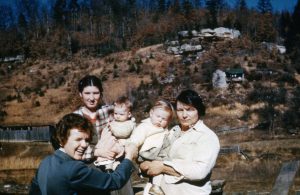

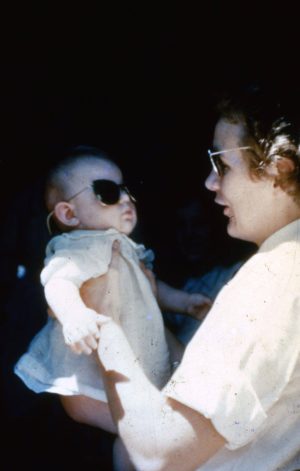
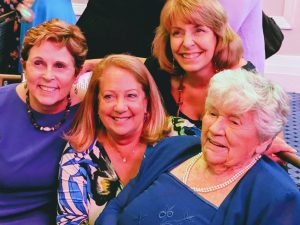

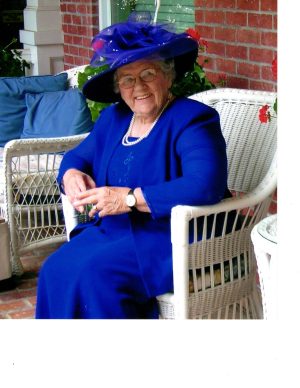
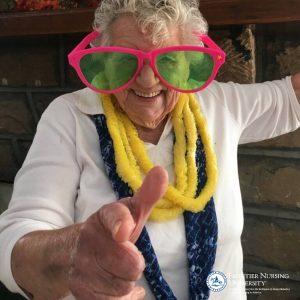

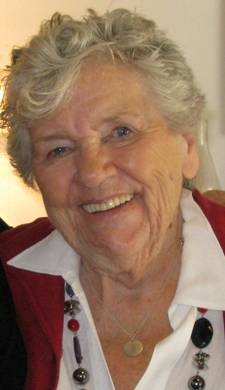
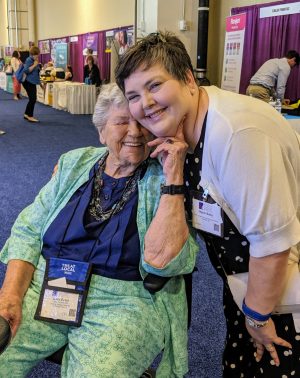

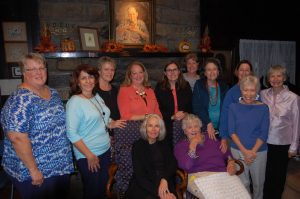
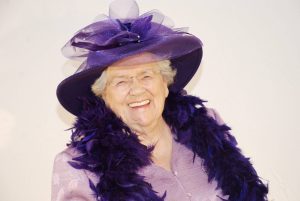
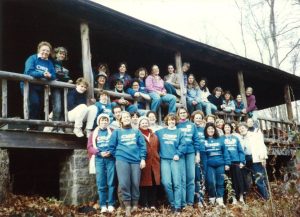

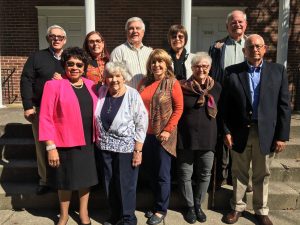

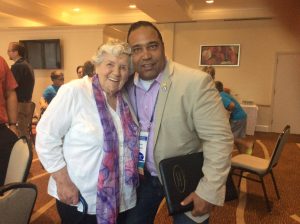
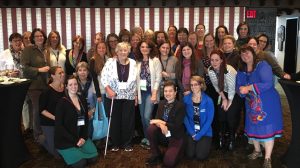
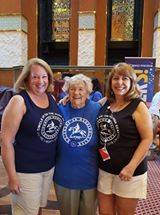



















 Carrie Belin is an experienced board-certified Family Nurse Practitioner and a graduate of the Johns Hopkins DNP program, Johns Hopkins Bloomberg School of Public Health, Georgetown University School of Nursing, and Johns Hopkins School of Nursing. She has also completed fellowships at Georgetown and the University of California Irvine.
Carrie Belin is an experienced board-certified Family Nurse Practitioner and a graduate of the Johns Hopkins DNP program, Johns Hopkins Bloomberg School of Public Health, Georgetown University School of Nursing, and Johns Hopkins School of Nursing. She has also completed fellowships at Georgetown and the University of California Irvine. Angie has been a full-scope midwife since 2009. She has experience in various birth settings including home, hospital, and birth centers. She is committed to integrating the midwifery model of care in the US. She completed her master’s degree in nurse-midwifery at Frontier Nursing University (FNU) and her Doctorate at Johns Hopkins University. She currently serves as the midwifery clinical faculty at FNU. Angie is motivated by the desire to improve the quality of healthcare and has led quality improvement projects on skin-to-skin implementation, labor induction, and improving transfer of care practices between hospital and community midwives. In 2017, she created a short film on skin-to-skin called
Angie has been a full-scope midwife since 2009. She has experience in various birth settings including home, hospital, and birth centers. She is committed to integrating the midwifery model of care in the US. She completed her master’s degree in nurse-midwifery at Frontier Nursing University (FNU) and her Doctorate at Johns Hopkins University. She currently serves as the midwifery clinical faculty at FNU. Angie is motivated by the desire to improve the quality of healthcare and has led quality improvement projects on skin-to-skin implementation, labor induction, and improving transfer of care practices between hospital and community midwives. In 2017, she created a short film on skin-to-skin called 










 Justin C. Daily, BSN, RN, has ten years of experience in nursing. At the start of his nursing career, Justin worked as a floor nurse on the oncology floor at St. Francis. He then spent two years as the Director of Nursing in a small rural Kansas hospital before returning to St. Francis and the oncology unit. He has been in his current position as the Chemo Nurse Educator for the past four years. He earned an Associate in Nurse from Hutchinson Community College and a Bachelor of Science in Nursing from Bethel College.
Justin C. Daily, BSN, RN, has ten years of experience in nursing. At the start of his nursing career, Justin worked as a floor nurse on the oncology floor at St. Francis. He then spent two years as the Director of Nursing in a small rural Kansas hospital before returning to St. Francis and the oncology unit. He has been in his current position as the Chemo Nurse Educator for the past four years. He earned an Associate in Nurse from Hutchinson Community College and a Bachelor of Science in Nursing from Bethel College. Brandy Jackson serves as the Director of Undergraduate Nursing Programs and Assistant Educator at Wichita State University and Co-Director of Access in Nursing. Brandy is a seasoned educator with over 15 years of experience. Before entering academia, Brandy served in Hospital-based leadership and Critical Care Staff nurse roles. Brandy is passionate about equity in nursing education with a focus on individuals with disabilities. Her current research interests include accommodations of nursing students with disabilities in clinical learning environments and breaking down barriers for historically unrepresented individuals to enter the nursing profession. Brandy is also actively engaged in Interprofessional Education development, creating IPE opportunities for faculty and students at Wichita State. Brandy is an active member of Wichita Women for Good and Soroptimist, with the goal to empower women and girls. Brandy is a TeamSTEPPS master trainer. She received the DASIY Award for Extraordinary Nursing Faculty in 2019 at Wichita State University.
Brandy Jackson serves as the Director of Undergraduate Nursing Programs and Assistant Educator at Wichita State University and Co-Director of Access in Nursing. Brandy is a seasoned educator with over 15 years of experience. Before entering academia, Brandy served in Hospital-based leadership and Critical Care Staff nurse roles. Brandy is passionate about equity in nursing education with a focus on individuals with disabilities. Her current research interests include accommodations of nursing students with disabilities in clinical learning environments and breaking down barriers for historically unrepresented individuals to enter the nursing profession. Brandy is also actively engaged in Interprofessional Education development, creating IPE opportunities for faculty and students at Wichita State. Brandy is an active member of Wichita Women for Good and Soroptimist, with the goal to empower women and girls. Brandy is a TeamSTEPPS master trainer. She received the DASIY Award for Extraordinary Nursing Faculty in 2019 at Wichita State University.  Dr. Sabrina Ali Jamal-Eddine is an Arab-disabled queer woman of color with a PhD in Nursing and an interdisciplinary certificate in Disability Ethics from the University of Illinois Chicago (UIC). Dr. Jamal-Eddine’s doctoral research explored spoken word poetry as a form of critical narrative pedagogy to educate nursing students about disability, ableism, and disability justice. Dr. Jamal-Eddine now serves as a Postdoctoral Research Associate in UIC’s Department of Disability and Human Development and serves on the Board of Directors of the National Organization of Nurses with Disabilities (NOND). During her doctoral program, Sabrina served as a Summer Fellow at a residential National Endowment of the Humanities (NEH) Summer Institute at Arizona State University (2023), a summer fellow at Andrew W. Mellon’s National Humanities Without Walls program at University of Michigan (2022), a Summer Research Fellow at UC Berkeley’s Othering & Belonging Institute (2021), and an Illinois Leadership Education in Neurodevelopmental and related Disabilities (LEND) trainee (2019-2020).
Dr. Sabrina Ali Jamal-Eddine is an Arab-disabled queer woman of color with a PhD in Nursing and an interdisciplinary certificate in Disability Ethics from the University of Illinois Chicago (UIC). Dr. Jamal-Eddine’s doctoral research explored spoken word poetry as a form of critical narrative pedagogy to educate nursing students about disability, ableism, and disability justice. Dr. Jamal-Eddine now serves as a Postdoctoral Research Associate in UIC’s Department of Disability and Human Development and serves on the Board of Directors of the National Organization of Nurses with Disabilities (NOND). During her doctoral program, Sabrina served as a Summer Fellow at a residential National Endowment of the Humanities (NEH) Summer Institute at Arizona State University (2023), a summer fellow at Andrew W. Mellon’s National Humanities Without Walls program at University of Michigan (2022), a Summer Research Fellow at UC Berkeley’s Othering & Belonging Institute (2021), and an Illinois Leadership Education in Neurodevelopmental and related Disabilities (LEND) trainee (2019-2020). Vanessa Cameron works for Vanderbilt University Medical Center in Nursing Education & Professional Development. She is also attending George Washington University and progressing towards a PhD in Nursing with an emphasis on ableism in nursing. After becoming disabled in April 2021, Vanessa’s worldview and perspective changed, and a recognition of the ableism present within healthcare and within the culture of nursing was apparent. She has been working since that time to provide educational foundations for nurses about disability and ableism, provide support for fellow disabled nursing colleagues, and advocate for the disabled community within healthcare settings to reduce disparities.
Vanessa Cameron works for Vanderbilt University Medical Center in Nursing Education & Professional Development. She is also attending George Washington University and progressing towards a PhD in Nursing with an emphasis on ableism in nursing. After becoming disabled in April 2021, Vanessa’s worldview and perspective changed, and a recognition of the ableism present within healthcare and within the culture of nursing was apparent. She has been working since that time to provide educational foundations for nurses about disability and ableism, provide support for fellow disabled nursing colleagues, and advocate for the disabled community within healthcare settings to reduce disparities. Dr. Lucinda Canty is a certified nurse-midwife, Associate Professor of Nursing, and Director of the Seedworks Health Equity in Nursing Program at the University of Massachusetts Amherst. She earned a bachelor’s degree in nursing from Columbia University, a master’s degree from Yale University, specializing in nurse-midwifery, and a PhD from the University of Connecticut. Dr. Canty has provided reproductive health care for over 29 years. Her research interests include the prevention of maternal mortality and severe maternal morbidity, reducing racial and ethnic health disparities in reproductive health, promoting diversity in nursing, and eliminating racism in nursing and midwifery.
Dr. Lucinda Canty is a certified nurse-midwife, Associate Professor of Nursing, and Director of the Seedworks Health Equity in Nursing Program at the University of Massachusetts Amherst. She earned a bachelor’s degree in nursing from Columbia University, a master’s degree from Yale University, specializing in nurse-midwifery, and a PhD from the University of Connecticut. Dr. Canty has provided reproductive health care for over 29 years. Her research interests include the prevention of maternal mortality and severe maternal morbidity, reducing racial and ethnic health disparities in reproductive health, promoting diversity in nursing, and eliminating racism in nursing and midwifery. Dr. Lisa Meeks is a distinguished scholar and leader whose unwavering commitment to inclusivity and excellence has significantly influenced the landscape of health professions education and accessibility. She is the founder and executive director of the DocsWithDisabilities Initiative and holds appointments as an Associate Professor in the Departments of Learning Health Sciences and Family Medicine at the University of Michigan.
Dr. Lisa Meeks is a distinguished scholar and leader whose unwavering commitment to inclusivity and excellence has significantly influenced the landscape of health professions education and accessibility. She is the founder and executive director of the DocsWithDisabilities Initiative and holds appointments as an Associate Professor in the Departments of Learning Health Sciences and Family Medicine at the University of Michigan. Dr. Nikia Grayson, DNP, MSN, MPH, MA, CNM, FNP-C, FACNM (she/her) is a trailblazing force in reproductive justice, blending her expertise as a public health activist, anthropologist, and family nurse-midwife to champion the rights and health of underserved communities. Graduating with distinction from Howard University, Nikia holds a bachelor’s degree in communications and a master’s degree in public health. Her academic journey also led her to the University of Memphis, where she earned a master’s in medical anthropology, and the University of Tennessee, where she achieved both a master’s in nursing and a doctorate in nursing practice. Complementing her extensive education, she completed a post-master’s certificate in midwifery at Frontier Nursing University.
Dr. Nikia Grayson, DNP, MSN, MPH, MA, CNM, FNP-C, FACNM (she/her) is a trailblazing force in reproductive justice, blending her expertise as a public health activist, anthropologist, and family nurse-midwife to champion the rights and health of underserved communities. Graduating with distinction from Howard University, Nikia holds a bachelor’s degree in communications and a master’s degree in public health. Her academic journey also led her to the University of Memphis, where she earned a master’s in medical anthropology, and the University of Tennessee, where she achieved both a master’s in nursing and a doctorate in nursing practice. Complementing her extensive education, she completed a post-master’s certificate in midwifery at Frontier Nursing University.









 Dr. Tia Brown McNair is the Vice President in the Office of Diversity, Equity, and Student Success and Executive Director for the Truth, Racial Healing, and Transformation (TRHT) Campus Centers at the American Association of Colleges and Universities (AAC&U) in Washington, DC. She oversees both funded projects and AAC&U’s continuing programs on equity, inclusive excellence, high-impact practices, and student success. McNair directs AAC&U’s Summer Institutes on High-Impact Practices and Student Success, and TRHT Campus Centers and serves as the project director for several AAC&U initiatives, including the development of a TRHT-focused campus climate toolkit. She is the lead author of From Equity Talk to Equity Walk: Expanding Practitioner Knowledge for Racial Justice in Higher Education (January 2020) and Becoming a Student-Ready College: A New Culture of Leadership for Student Success (July 2016 and August 2022 Second edition).
Dr. Tia Brown McNair is the Vice President in the Office of Diversity, Equity, and Student Success and Executive Director for the Truth, Racial Healing, and Transformation (TRHT) Campus Centers at the American Association of Colleges and Universities (AAC&U) in Washington, DC. She oversees both funded projects and AAC&U’s continuing programs on equity, inclusive excellence, high-impact practices, and student success. McNair directs AAC&U’s Summer Institutes on High-Impact Practices and Student Success, and TRHT Campus Centers and serves as the project director for several AAC&U initiatives, including the development of a TRHT-focused campus climate toolkit. She is the lead author of From Equity Talk to Equity Walk: Expanding Practitioner Knowledge for Racial Justice in Higher Education (January 2020) and Becoming a Student-Ready College: A New Culture of Leadership for Student Success (July 2016 and August 2022 Second edition).